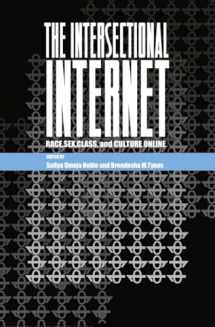
The Intersectional Internet: Race, Sex, Class, and Culture Online (Digital Formations)
ISBN-13:
9781433130014
ISBN-10:
1433130017
Edition:
New
Author:
Safiya Umoja Noble, Brendesha M. Tynes
Publication date:
2016
Publisher:
Peter Lang Inc., International Academic Publishers
Format:
Hardcover
278 pages
FREE US shipping
on ALL non-marketplace orders
Marketplace
from $113.93
USD
Marketplace offers
Seller
Condition
Note
Seller
Condition
Used - Like New
Book details
ISBN-13:
9781433130014
ISBN-10:
1433130017
Edition:
New
Author:
Safiya Umoja Noble, Brendesha M. Tynes
Publication date:
2016
Publisher:
Peter Lang Inc., International Academic Publishers
Format:
Hardcover
278 pages
Summary
The Intersectional Internet: Race, Sex, Class, and Culture Online (Digital Formations) (ISBN-13: 9781433130014 and ISBN-10: 1433130017), written by authors
Safiya Umoja Noble, Brendesha M. Tynes, was published by Peter Lang Inc., International Academic Publishers in 2016.
With an overall rating of 4.5 stars, it's a notable title among other
books. You can easily purchase or rent The Intersectional Internet: Race, Sex, Class, and Culture Online (Digital Formations) (Hardcover) from BooksRun,
along with many other new and used
books
and textbooks.
And, if you're looking to sell your copy, our current buyback offer is $0.3.
Description
From race, sex, class, and culture, the multidisciplinary field of Internet studies needs theoretical and methodological approaches that allow us to question the organization of social relations that are embedded in digital technologies, and that foster a clearer understanding of how power relations are organized through technologies. Representing a scholarly dialogue among established and emerging critical media and information studies scholars, this volume provides a means of foregrounding new questions, methods, and theories which can be applied to digital media, platforms, and infrastructures. These inquiries include, among others, how representation to hardware, software, computer code, and infrastructures might be implicated in global economic, political, and social systems of control. Contributors argue that more research needs to explicitly trace the types of uneven power relations that exist in technological spaces. By looking at both the broader political and economic context and the many digital technology acculturation processes as they are differentiated intersectionally, a clearer picture emerges of how under-acknowledging culturally situated and gendered information technologies are impacting the possibility of participation with (or purposeful abstinence from) the Internet. This book is ideal for undergraduate and graduate courses in Internet studies, library and information studies, communication, sociology, and psychology. It is also ideal for researchers with varying expertise and will help to advance theoretical and methodological approaches to Internet research.


We would LOVE it if you could help us and other readers by reviewing the book
Book review

Congratulations! We have received your book review.
{user}
{createdAt}
by {truncated_author}


